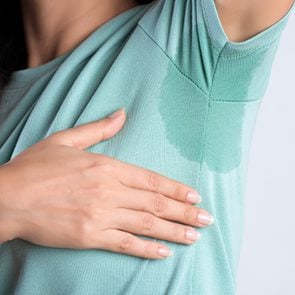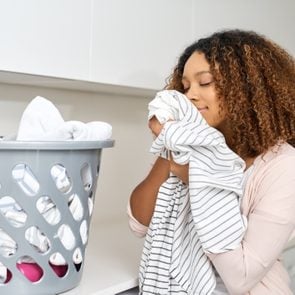Here’s How Often You Should Wash Your Sheets—and the Gross Things That Happen When You Don’t
Updated: Apr. 24, 2024
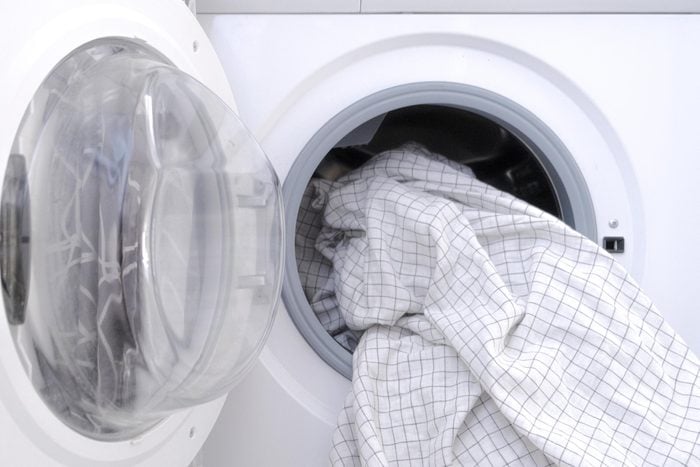
A microbiologist, dermatologist and cleaning pro explain just how often you should change your sheets
What’s better than climbing into bed with freshly laundered sheets? Not much. But as nice as that feeling is, it’s easy to put off the chore. (Guilty!) In fact, according to a Mattress Advisor survey, the average person changes sheets roughly every 24 days. But how often should you change your sheets? I got the down-and-dirty details from the pros on sheet-washing frequency and the gross reasons why it should happen more often.
After speaking with a microbiologist, dermatologist and housekeeping expert for this piece, I changed my lazy laundry ways and immediately put my sheets into the wash. Because after 15 years as a cleaning editor, I’m still willing to be schooled on what I could be doing better to keep my house and my family in tip-top shape. You may know how to do laundry, but do you know the best way to launder your sheets—and just how often you should do so? You’ll find out below!
Get Reader’s Digest’s Read Up newsletter for more cleaning, tech, travel, humor and fun facts all week long.
About the experts
Reviewed for accuracy by: Mary Marlowe Leverette, a highly regarded fabric-care, stain-removal and housekeeping expert with more than 40 years of experience. |
How often should you change your sheets?
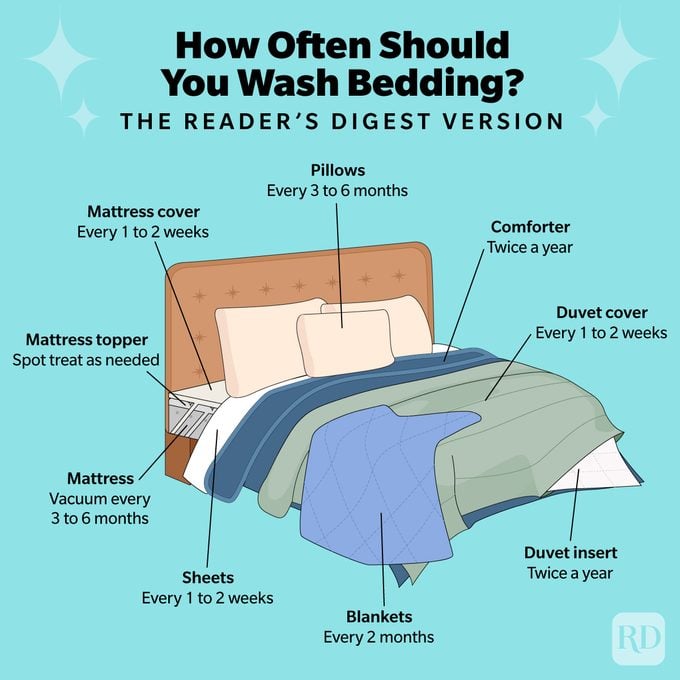
It’s best to change your sheets at least every two weeks, according to Charles Gerba, PhD, a microbiologist who’s been given the nickname “Dr. Germ” for his eye-opening knowledge about the nasty stuff that lurks among everyday objects. You sleep on your sheets daily, for hours at a time, transferring organic matter and bacteria that can not only lead to odor if left to linger too long, but also affect your health. Gerba equates it to wearing the same clothes for two weeks straight.
“You’re dealing with a concentrated buildup of dirt and other organisms,” says Gerba. “Sweat, saliva, mucous and skin tissue—we’re shedding skin constantly—these are all ideal things for bacteria to grow on.”
When should you wash sheets more frequently?
You should wash your sheets even more frequently (weekly, ideally) if you have certain skin conditions or allergies. “This frequency helps remove accumulated sweat, oils, dead skin cells and bacteria from the sheets, reducing the risk of skin irritation, acne breakouts and other skin problems,” says Tiffany Libby, MD, a board-certified dermatologist based in Rhode Island. What other factors determine how often you should toss your sheets in the wash?
If you shower in the morning
Whether you shower in the morning or at night is a personal preference and entirely dependent on your lifestyle habits. And neither option is wrong. If you shower in the morning, though (and don’t rinse before bedtime), you do risk transferring dirt and bacteria accumulated on your skin during the day into your bed at night. So more frequent sheet-washing may be necessary.
| ♦ Expert laundry tip |
| To avoid moldy pillows, dry your hair. While p.m. showers eliminate the daily grime, sleeping with wet hair creates a warm and damp environment that is optimal for bacteria to grow in. This can lead to moldy pillows, says Gerba, as well as scalp and skin infections. |
If you’re a sweaty sleeper
You’ll want to wash your sheets more frequently if you sweat excessively during sleep, “either due to hot weather, intense physical activity or medical conditions, such as hyperhidrosis,” says Dr. Libby.
If you have allergies
Dust mites, pet dander and pollen are just a few of the allergens that can accumulate on your sheets, so those with allergies will benefit from more frequent washing. And as nice as that fresh outdoor air might seem, Gerba discourages people from hanging their sheets outdoors to dry. In fact, you’ll run the risk of pollen accumulating on your freshly laundered linens!
If you have pets
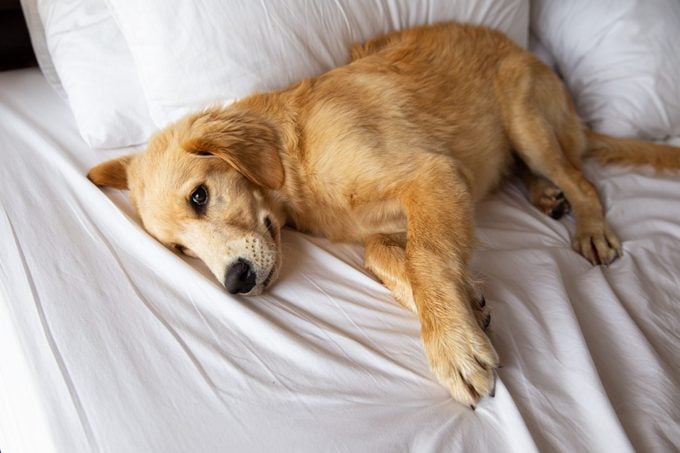
Gerba says there is generally a low incidence of transfer from cats and dogs, but they will add to the overall amount of bacteria in your space. And if these animals sleep in bed with you, their fur and drool can add to the buildup of bacteria. If your pets get cozy next to you, you’ll want to wash your bedding more frequently. If you’ve got some more exotic pets (turtles, lizards, snakes), Gerba warns never to bring those pets into bed with you, as they carry salmonella. Wash your hands anytime you handle those types of pets.
If you’ve been ill
When we’re sick, we tend to lay in bed even more than usual. If you or your housemate(s) have been ill, you’ll want to launder your linens more frequently to remove those germs and prevent the infection from spreading. Gerba says to wash sheets once symptoms disappear to make sure you don’t get re-exposed.
| ♦ Expert laundry tip |
| Practice extra caution. If you had a cold, the flu or diarrhea, consider using a mask while handling dirty sheets. “When you take up the sheets, you aerosolize the bacteria and could cause it to spread to yourself or other household members,” Gerba says. |
If you sleep naked
Those who prefer to sleep naked may also want to wash their sheets more frequently. Cleaning expert Melissa Pateras, author of A Dirty Guide to a Clean Home, points out that sleeping in pajamas creates a barrier between the sheets and the skin, leading to less skin shedding directly on the sheets. As a result, sleeping without pajamas means more buildup of sweat, oils, dead skin cells and dirt on the sheets—and the need for more frequent laundering.
If you have a skin condition
“Individuals with certain skin conditions, such as eczema, psoriasis or dermatitis may benefit from washing sheets more often to reduce irritation and discomfort,” advises Dr. Libby.
If you use electronics in bed
While Gerba points out that the biggest buildup on your sheets will be soil and skin, tablets or other electronic devices can also transfer a small amount of bacteria.
| ♦ Expert laundry tip |
| Use a mattress protector. According to Pateras, using a mattress cover can act as a barrier and protect mattresses against dirt, sweat and stains. Regular washing of the mattress cover is “a lot easier than having to clean the mattress regularly,” she explains. |
What happens if you don’t change your bedsheets regularly?
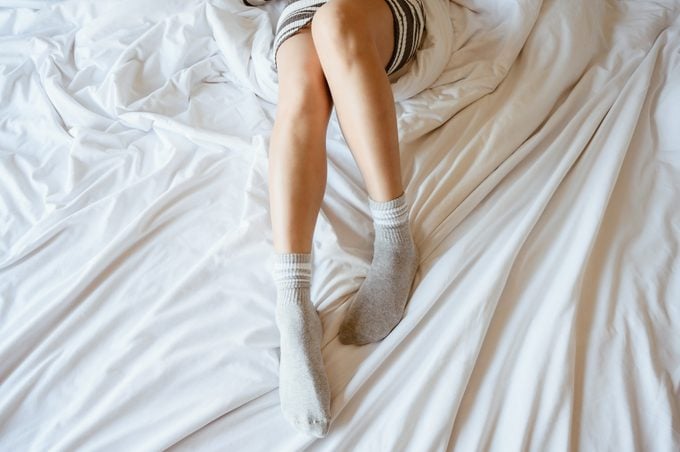
If you’re not changing your sheets at least every two weeks, as the experts recommend, here are some reasons you may want to increase the frequency.
Dead skin buildup
If you’re getting eight hours of shut-eye, that means you spend one-third of every day in bed. During that time, friction between your skin and the sheets causes dead skin to slough off (the average person sheds about 1.5 grams of dead skin each day) and creates an ideal spot for bacteria to grow. A buildup of bacteria is not only dirty to sleep in, but it also ultimately leads to a buildup of odor, says Gerba.
Dust mites
According to the Asthma and Allergy Foundation of America (AAFA), dust mites may be the most common trigger of year-round allergies. Since these microscopic mites feed mainly on humans’ shed skin, they are often found in our bedding. The longer you go between washes, the more dust mites build up. The AAFA says that the amount of skin an average adult sheds in a day can feed up to 1 million dust mites—disgusting. Frequent washing of sheets in hot water will kill the mites and help reduce allergic reactions.
Acne
Laying your head on sheets and pillowcases that are infused with excess oils, dead skin cells and bacteria can contribute to acne breakouts, says Dr. Libby.
Sickness
If you or someone in your house has been ill, the germs may remain on your sheets until they are killed in the wash using hot water. As Gerba warns above, these germs can aerosolize and reinfect you or other household members.
| ♦ Expert laundry tip |
| Know when it’s time for new sheets. Some of the signs that you need to invest in new sheets include pilling, tearing, thinning and stretching. If your sheets have stains that can’t be removed, they don’t smell fresh after washing anymore or they just don’t feel as good against your skin, it’s time to invest in a new set. |
How to wash sheets
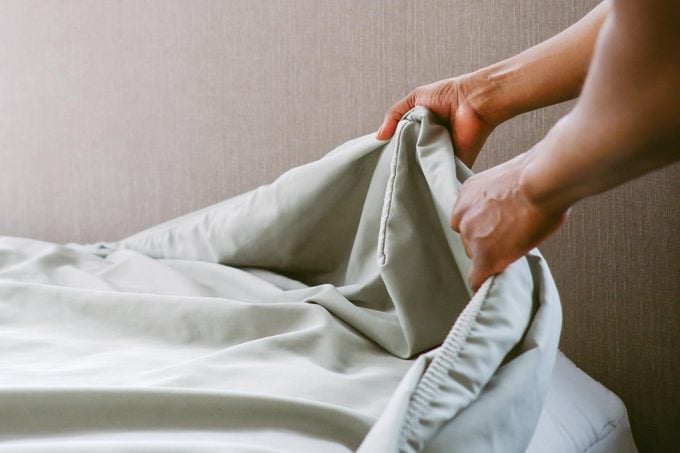
Pateras recommends washing sheets separately from other laundry. Follow the step-by-step method she uses weekly.
Supplies you’ll need
- Stain remover
- Laundry detergent
- Rinse agent (such as Downy Rinse and Refresh or Tide Clean Boost)
- Dryer balls (optional)
Directions
- Strip the sheets from the bed, and check the care label.
- Pre-treat any stains using your stain remover of choice. Liquid dish soap, hydrogen peroxide, vinegar or enzymatic stain removers are good choices depending on the type of stain.
- Place the sheets in your washing machine, and pour in a high-quality laundry detergent.
- Unless otherwise noted on the care instructions, select the normal cycle on your washing machine, opting for warm or hot water. (Hot water is best when there is a need for disinfection or allergy control.)
- Add a rinse agent into the fabric-softener compartment if you or your partner tend to sweat a lot, suggests Pateras. “A detergent booster will help rinse away the smelly residue trapped within fabric fibers,” she explains.
- After the wash cycle is complete, separate the pillowcases from the top sheet and fitted sheet so they do not get trapped inside one another.
- Transfer everything to the dryer.
- Dry on a low heat setting.
| ♦ Expert laundry tip |
| Try dryer balls. Adding four to five dryer balls can reduce static and help dry the sheets faster. Because wool dryer balls are super absorbent and let warm air circulate better, you’re able to cut drying time. |
How often should you wash other bedding?
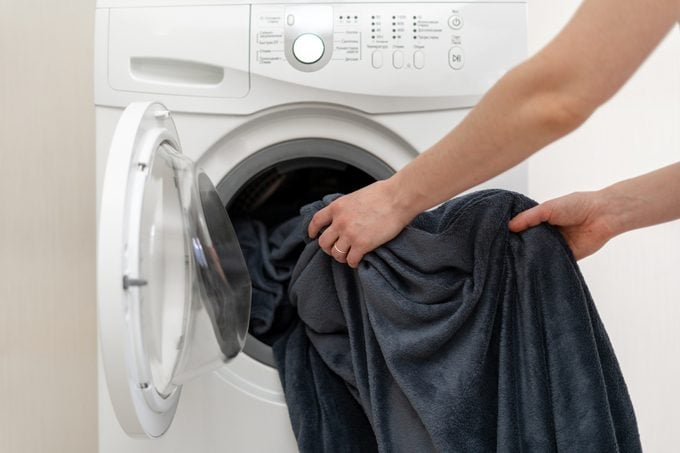
While sheets should be washed most frequently because they come into close contact with your skin, dirt and debris, other bedding needs attention too. If you use a duvet cover, wash the cover with the sheets. Wash a down comforter or duvet insert separately and at least twice a year.
As with all bedding, blankets should be washed before the first use, as “many fabrics are treated with chemicals to prevent mold and mildew from developing during the shipping process (and myriad other reasons),” Pateras says. After that, wash blankets every month or two. Keep in mind that to launder comforters or large blankets, you may need to use a laundromat’s industrial machine with a larger-capacity drum.
Learning how to wash pillows is relatively simple. Most pillows filled with cotton, feather, down and fiberfill can be washed every three to six months on a delicate cycle using your regular detergent. Never wash foam pillows in a washing machine. And lastly, take care of your mattress. Vacuum the mattress for dust mites every three to six months (more frequently if someone in your home has allergies). And spot clean your mattress and mattress topper as needed.
Here’s a quick cheat sheet for how often you should change your sheets and clean other types of bedding:
- Sheets: Every 1 to 2 weeks
- Mattress cover: Every 1 to 2 weeks
- Duvet cover: Every 1 to 2 weeks
- Duvet insert: Twice a year
- Comforter: Twice a year
- Blankets: Every 2 months
- Pillows: Every 3 to 6 months
- Mattress: Vacuum every 3 to 6 months
- Mattress topper: Spot treat as needed
Why trust us
At Reader’s Digest, we’re committed to producing high-quality content by writers with expertise and experience in their field in consultation with relevant, qualified experts. For this piece, Stephanie Sisco tapped her 15 years of experience as a cleaning editor, and then Mary Marlowe Leverette, a fabric-care, stain-removal and laundry expert with more than 40 years of industry experience, gave it a rigorous review to ensure that all information is accurate and offers the best possible advice to readers. We verify all facts and data, back them with credible sourcing and revisit them over time to ensure they remain accurate and up to date. Read more about our team, our contributors and our editorial policies.
Sources:
- Charles Gerba, PhD, professor of microbiology at the University of Arizona; phone interview, Feb. 15, 2024
- Tiffany J. Libby, MD, FAAD, FACMS, board-certified dermatologist at Brown Dermatology in Rhode Island; email interview, Feb. 18, 2024
- Melissa Pateras, author of A Dirty Guide to a Clean Home and online cleaning personality; email interview, Feb. 19, 2024
- Asthma and Allergy Foundation of America: “Dust Mite Allergy”
- Mattress Advisor: “How Often Americans Change Their Sheets”


